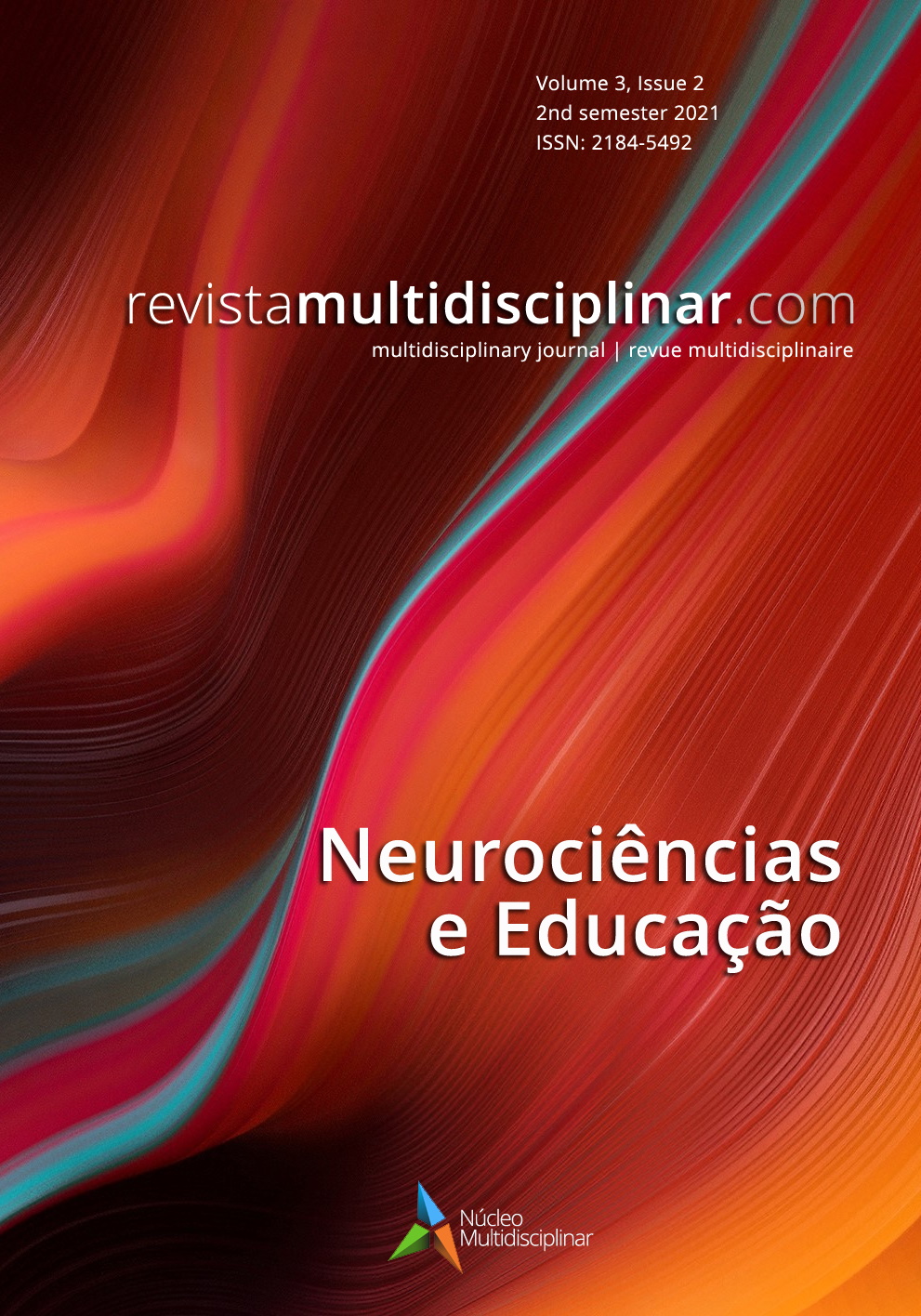O mito do ensino por estilos de aprendizagem
Qual a perceção de diferentes profissionais em contexto escolar?
DOI:
https://doi.org/10.23882/NE2143Palavras-chave:
estilos de aprendizagem preferenciais, neuromitos na educação, psicólogos, terapeutas da fala, professoresResumo
A teoria dos estilos de aprendizagem preferenciais está disseminada no campo da educação, mas já são vários os estudos, especialmente vindos das neurociências cognitivas, que concluem a falta de dados que comprovem qualquer benefício em usá-las no ensino. Neste estudo, através de um questionário, fomos verificar qual a perceção sobre os estilos de aprendizagem de diferentes profissionais a exercer funções em contexto escolar. Participaram no total 136 profissionais, entre os 22 e 68 anos de idade (M=38,5 anos; DP=10,51), sendo 95% do sexo feminino. A média de experiência profissional é de 13.8 anos (SD = 9.15). Analisámos as respostas de três grupos de profissionais, Professores (n=42), Psicólogos (n=44) e Terapeutas da Fala (n=50) e não encontrámos diferenças nas suas respostas, na medida em que, em todos os grupos, a atribuição de facto científico sobre os benefícios do ensino por estilos de aprendizagem foi acima dos 80%. Os nossos resultados vão de encontro à literatura que indica que os estilos de aprendizagem preferenciais estão difundidos no contexto escolar, com a particularidade de acrescentar que não atinge apenas os professores. À luz desta indiferenciação verificada quanto à área de especialização, relança-se a discussão para o possível impacto deste enviesamento nas diferentes práticas em contexto escolar.
Referências
Brod, G., & Breitwieser, J. (2019). Lighting the wick in the candle of learning: generating a prediction stimulates curiosity. NPJ Science of Learning, 4(17), 1-7. doi:10.1038/s41539-019-0056-y
Bruer, J. T. (1997). Education and the Brain: A bridge too far. Educational Researcher (26), 4-16.
Dekker, S., Lee, N. C., P., H.-J., & Jolles, J. (2012). Neuromyths in education: Prevalence and predictors of misconceptions among teachers. Frontiers in Psychology. doi:10.3389/fpsyg.2012.00429
Howard-Jones, P. A. (2014). Neuroscience and education: Myths and messages. Nature Reviews Neuroscience, 15(12), 817–824. doi:10.1038/nrn3817
Hughes, B., Sullivan, K. A., & Gilmore, L. (2020). Why do teachers believe educational neuromyths? Trends in Neuroscience and Education. doi:10.1016/j.tine.2020.100145
Kirschner, P. A. (2017). Stop propagating the learning styles myth. Computers & Education, 106, 166-171. doi:10.1016/j.compedu.2016.12.006
McMahon, K., Yeh, C. S., & Etchells, P. J. (2019). The Impact of a Modified Initial Teacher Education on Challenging Trainees' Understanding of Neuromyths. Mind, Brain, and Education, 13(4), 1-10. doi:10.1111/mbe.12219
Metcalfe, J., & Kornell, N. (2007). Principles of cognitive science in education: the effects of generation, errors, and feedback. Psychonomic Bulletins & Review, 225-229.
OECD. (2002). Understanding the Brain: Towards a New Learning Science. Paris: OECD. Paris: Organisation for Economic Co-operation and Development.
Pashler, H., McDaniel, M., Rohrer, D., & Bjork, R. (2009). Learning Styles - Concepts and Evidence. Psychological Science in the Public Interest, 9(3), 105-119. doi:10.1111/j.1539-6053.2009.01038.x
Pastou-Papadatou, Marietta, Gritzali, M., & Barrable, A. (2018). The Learning Styles Educational Neuromyth: Lack of Agreement Between Teachers's Judgements, Self-Assessment, and Students's Intelligence. Frontiers in Education, 3(105). doi:10.3389/feduc.2018.00105
Rato, J. R. (2014). Mente, Cérebro e Educação: Um campo transdisciplinar em expansão. Povos e Culturas (18), 39-46.
Rato, J. R., Abreu, A. M., & Castro-Caldas, A. (2011). Achieving a successful relationship between neuroscience and education: the views of portuguese teachers. Procedia - Social and Behavioral Sciences (29), 879-884.
Rato, J. R., Abreu, A. M., & Castro-Caldas, A. (2013). Neuromyths in education: what is fact and what is fiction for Portuguese teachers? Educational Research, 55(4), 441-453.
Rato, J., & Castro-Caldas, A. (2010). Neurociências e educação: Realidade ou ficção? In C. Nogueira, I. Silva, L. Lima, A. T. Almeida, R. Cabecinhas, R. Gomes, C. Machado, A. Maia, A. Sampaio & M. C. Taveira (Eds.), Actas do VII Simpósio Nacional de Investigação em Psicologia. Universidade do Minho: Portugal.
Rato, J., Rocha, M., Amorim, J., Abreu, A.M., Strauss, S., & Castro Caldas, A. (abstract accepted 2021). Neuromyths in education: Do Psychologists and Speech-Language Pathologists share Teachers’ beliefs? Frontiers in Education.
Reber, T. P., & Rothen, N. (2018). Educational App-Development needs to be informed by the Cognitive Neurosciences of Learning & Memory. NPJ Science of Learning, 3(22), 1-2. doi:10.1038/s41539-018-0039-4
Rogowsky, B. A., Calhoun, B. M., & Tallal, P. (2020). Providing Instruction Based on Student's Learning Style Preferences Does Not Improve Learning. Frontiers in Psychology. doi:10.3389/fpsyg.2020.00164
Schregel, S., & Broer, T. (2020). Introduction: Contested narratives of the mind and the brain: Neuro/psychological knowledge in popular debates and everyday life. History of the Human Sciences, 33(5), 3-11. doi:10.1177/0952695120972915
Tardif, E., Doudin, P.-A., & Meylan, N. (2015). Neuromyths Among Teachers and Student Teachers. Mind, Brain, and Education, 9(1), 50-59. doi:10.1111/mbe.12070
Thomas, M. S., Ansari, D., & Knowland, V. C. (2019). Annual Research Review: Educational neuroscience. Journal of Child Psychology and Psychiatry and Allied Disciplines, 60(4), 477-492. doi:10.1111/jcpp.12973
van Kesteren, M. T., & Meeter, M. (2020). How to optimize knowledge construction in the brain. NPJ Science of Learning, 5(5), 1-7. doi:10.1038/s41539-020-0064-y
Willingham, D. T., Hughes, E. M., & Dobolyi, D. G. (2015). The Scientific Status of Learning Styles Theories. Teaching of Psychology, 42(3), 266-271. doi:10.1177/0098628315589505
Downloads
Publicado
Como Citar
Edição
Secção
Licença
Direitos de Autor (c) 2021 Jorge Amorim, Joana Rodrigues Rato

Este trabalho encontra-se publicado com a Creative Commons Atribuição-NãoComercial 4.0.









